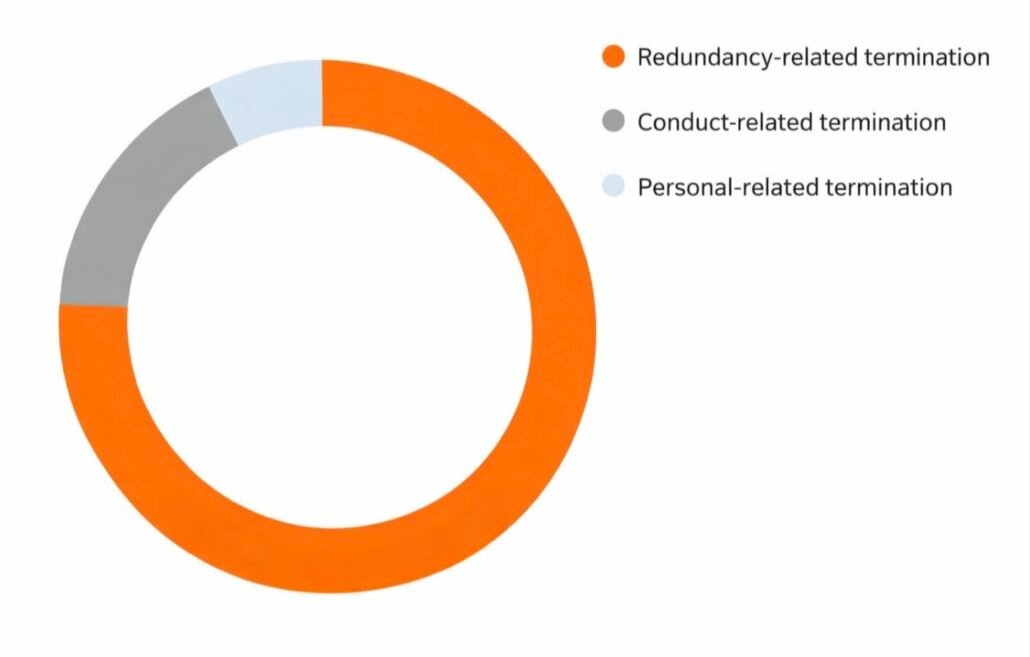

Dismissal for operational reasons is the most common type of termination under German labor law. It occurs when “business needs,” such as restructuring or downsizing, permanently eliminate a position. Courts closely scrutinize these dismissals to ensure fairness, including whether the employee could be reassigned within the company and whether a proper social selection was conducted. Employees are often offered severance payments in such cases. This article explains all legal requirements, practical examples of valid and invalid dismissals, and guidance on handling such situations.
Calculate your severance payment
Calculate the settlement amount for your individual case in 2 minutes
Key takeaways
- A dismissal for operational reasons (“betriebsbedingte Kündigung”) is legally permissible only if urgent business needs exist, no alternative employment is available, and social selection is properly conducted. Courts check all three conditions strictly.
- Employees have a right to challenge a dismissal with a termination protection lawsuit within three weeks. Acting promptly preserves legal options.
- Severance is commonly offered to avoid lengthy court disputes, though no statutory entitlement exists in most cases. The amount usually depends on tenure and salary.
- Procedural requirements, including proper form and consultation with works councils, must be met for the dismissal to be valid. Violations can render a termination ineffective.
Contents
Relevance of dismissal for operational reasons
Dismissal for operational reasons is one of three legal types of terminations under the German Protection Against Dismissal Act (“Kündigungsschutzgesetz”), alongside behavioral and personal dismissals. It accounts for roughly 75% of all terminations.

Recent economic challenges have increased its frequency. Companies must justify that no viable position exists within the organization and follow strict legal requirements to avoid invalidity. Keep documentation of your job performance and communications ready. Courts often examine employee records in disputes over operational dismissals.
Reasons for dismissal for operational reasons
A dismissal for operational reasons is only lawful under three conditions:
- Urgent business need: The job must be permanently eliminated, and the employer must provide proof.
- Social selection: If multiple comparable positions exist, the employer decides based on seniority, age, family obligations, and disability. Mistakes here can invalidate the dismissal.
- No alternative employment: No other suitable position should be available within the company; less attractive or company-wide options must also be considered.
1. Urgent business need
There must be circumstances that lead to the permanent elimination of the employee’s position. The employer bears the burden of proof that the position is permanently redundant.
External reasons occur outside the company but have the effect of permanently eliminating positions.
- Examples include the cancellation of a contract or project the employee was assigned to. If the employer adjusts staffing to match reduced orders or workload, this can constitute an urgent business need. Broader market declines, loss of subsidies, removal of funding, or new tariffs and sanctions affecting company products can also justify external operational dismissals.
Internal reasons arise when the employer implements organizational measures that eliminate a role.
- Examples include department mergers, rationalization or efficiency projects (such as AI or automation), outsourcing to external providers, branch closures (e.g., supermarkets or department stores), or reduction of hierarchy levels (for instance, elimination of team leader positions).
Courts apply a limited review standard: they do not assess whether the employer’s decision is optimal, only whether it is manifestly unreasonable or arbitrary. However, the decision must be genuinely implemented. Courts check if the organizational change truly removed the need for the employee’s position.
Calculate your severance payment
Calculate the settlement amount for your individual case in 2 minutes
2. Social selection
A valid operational dismissal also requires a proper social selection. This involves evaluating which employees are most deserving of protection, and mistakes can invalidate the dismissal. Errors often occur in collecting data, forming comparison groups, and weighing criteria such as age or length of service.
The main criteria are:
- Length of service
- Maintenance obligations
- Age
- Recognized disability
Points are assigned to each factor. The higher the total, the more protected the employee.
For example:
- Length of service: 1 point per year for the first ten years, 2 points per year thereafter. Only service up to age 55 typically counts, allowing a maximum of 70 points.
- Maintenance obligations: 4 points for each dependent child.
- Age: 1 point per year up to 55, maximum 55 points.
- Disability: 5 points for recognized disability up to 50%, plus 1 additional point per 10% over 50%, with a maximum of 10 points.
3. No alternative employment
There must be no other suitable positions in the company. Employers may need to consider less attractive roles or check company-wide availability. Positions with lower pay must also be considered. Only in exceptional cases can an offer be ignored, for example, if it is unreasonable for the employee to accept, such as if the offer is insulting or degrading.
General invalidity of redundancies
- Normal type of dismissal:
- An operational dismissal is a “normal” termination.
- In addition to specific operational reasons, general requirements for procedure, form, and deadlines apply.
- Example: If written form is not observed (e.g., only signed via DocuSign), the dismissal is invalid, even if social selection was correct.
- Procedural rules:
- Works council: Must always be consulted before an operational dismissal.
- Consultation must include all relevant information so the works council can fully assess the dismissal.
- Severely disabled employees: Prior approval from the Integration Office is required.
- Mass layoffs: Additional rules apply, e.g., notification to the Federal Employment Agency.
- Enhanced dismissal protection:
- Applies to groups such as works council members, pregnant employees, employees on parental leave, and severely disabled employees.
- These groups have additional substantive and procedural requirements.
- If these are not followed, the dismissal is invalid.
Free initial consultation with a lawyer
Quick callback after 1 to 2 hours for a free initial consultation with a lawyer
Dismissal without notice for operational reasons
A dismissal for operational reasons “without notice” (fristlose Kündigung) is rare and allowed only when continuing employment until the regular notice period is unreasonable. Courts generally reject such terminations unless no ordinary dismissal is possible.
Unemployment benefits
Employees dismissed for operational reasons are generally entitled to unemployment benefits. The employment agency verifies that the termination was indeed operational. Severance may affect benefits if it exceeds statutory thresholds.
Severance entitlement
Employees may receive severance even without a statutory claim to avoid litigation. The amount depends on factors such as duration of employment, salary, and potential legal challenges.
What to do
- Review the dismissal letter for proper signatures and written form.
- Do not sign any settlement or termination agreement without legal advice.
- Note the three-week deadline for a termination protection claim and act quickly. Filing a claim may preserve rights while negotiating a settlement.
- Consider consulting a labor law specialist for initial advice on options, rights, and potential severance.

Calculate severance pay now free of charge
- Calculate potential severance payment amount
- Strategy for negotiating a fair severance payment
- Find suitable lawyers for labour law
Frequently asked questions (FAQs)

Free initial consultation with a specialist lawyer
- Free initial consultation with a lawyer
- Quick callback after 1 to 2 hours
- Strategy for negotiating the severance pay
- Lost your job in Germany: How much severance pay can you get?
- Social plan & reconciliation of interests: severance pay and criteria
- Reconciliation of interests: Employee rights during company restructuring
- Redundancy rules in Germany: social selection explained
- What happens to untaken holidays when you lose your job in Germany?




